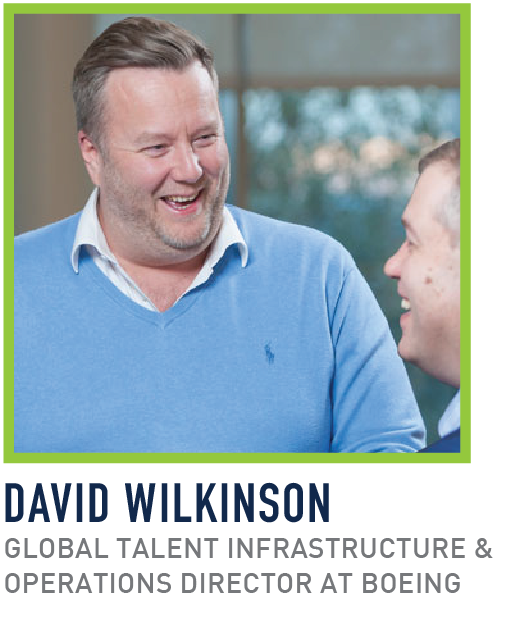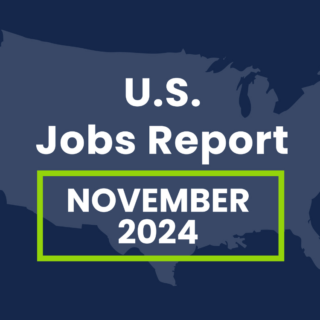
David Wilkinson spends a lot of time in airplanes, and that’s not just because he works for Boeing. In global talent acquisition at the aerospace giant, he has lived and worked in London and Dubai and now leads his team from Mesa, Arizona in the U.S. While a lot of people talk about globalizing talent acquisition, David actually lives it.
Regardless of whether he is looking towards the future of Boeing in the deserts of the U.S., the drizzle of the UK or the heat of the UAE, he is a talent champion. He’s also a member of the PeopleScout community. For this issue of PeopleScout NEXT, we caught up with David on an early morning call to learn about his insights on the future of talent acquisition.
What is the mission of Boeing Global Talent Acquisition?
Our journey is to become global talent champions. To us, that means delivering best-in-class solutions that unleash the full potential of Boeing’s people, products and services.
I’m really excited by that mission because it requires us to celebrate and champion talent at every opportunity. It also acknowledges the fact that it is a competition for talent, and we’re here to win.
What are some of your priorities as your team looks to the future?
The two things that I really think are the needle movers for us are operating globally and embracing an intentional use of talent technology. We are excited to work with PeopleScout and other valued partners in pursuit of those goals.
One of our main priorities is evolving our approach to talent technology. We’re working towards a holistic end-to-end technology strategy that will use data-driven insights to inform our experience and activities. I’m hoping that strategy will enable our teams to deliver the best experience every time, at every touch point.
What tools, methods and strategies are you exploring to achieve your approach to talent technology?
For me, the single greatest opportunity is technology. It’s also our single greatest dependency.
We’re adopting Workday globally. Given our scale, this is a significant endeavor. It’s been a two-year project, and we’re going to implement in 2019. So, our focus is on maximizing every opportunity that this change offers.
I see great potential for more intentional tools usage. When you implement a brand-new technology, you can be more intentional about that technology and the way you use your tools, processes and systems. What does that entail for Boeing talent acquisition? It means looking at artificial intelligence, business automation, access to real-time data and more.
We also see opportunities in technology to enable our global journey. Working in talent acquisition in London for eight years, Dubai for 10 years and now the U.S., I’ve learned that there are very, very few truly global tools. What’s big in the U.S. might not be big in Europe and may not be used at all in Asia, for example. This is an important opportunity for us and one that I believe will truly impact the candidate experience.
What are you most proud of in your role at Boeing?
I have been really lucky to lead some great teams globally, and specifically, I’ve been really lucky with Boeing to lead teams in London, Manchester, Delhi, Bangalore, Dubai, Riyadh, Nepal, Beijing, Tokyo, Mesa, Chicago and Seattle. Each of these experiences has influenced my personal development.
When I look at Boeing’s mission to Connect, Protect, Explore and Inspire Our World Through Aerospace Innovation, I embrace the global nature of that mission and the power of connectivity. We want to connect, protect, explore and inspire the world.
My experience and my career journey across the globe demonstrate the power of connectivity. I’m proud to be learning and developing alongside teammates in Mesa and nationwide. So, I’m most proud of the global nature of my role and the journey I have been on – and how I have personally and professionally developed throughout that process.
What are you excited about for the future of talent acquisition?
It’s a similar theme – the opportunities provided by global technology and the opportunity to operate as a team that is globally efficient, locally relevant and resolutely focused on the candidate and user experience.
The opportunities that come with a global talent approach are long established. We know that, for example, there are a million graduates in India. There are also 200,000 Chinese nationals who pursue further education in the U.S., but they have yet to truly be embraced because it is difficult for employers to hire them.
We need to make it easier for talent to move around the globe, and even if you just look on a local scale, we need to make it easier for talent to move around the country. Then we need to make it possible for workers who have been influenced and enriched by an experience in a new location to return home with a more global perspective and stronger than when they left. That’s huge.
I’m energized daily by our mission to become global talent champions and to embrace an intentional use of talent technology. As I look to the future, that is what I’m most excited about as we evolve our partnership with PeopleScout and other valued partners.


